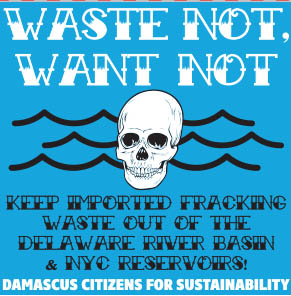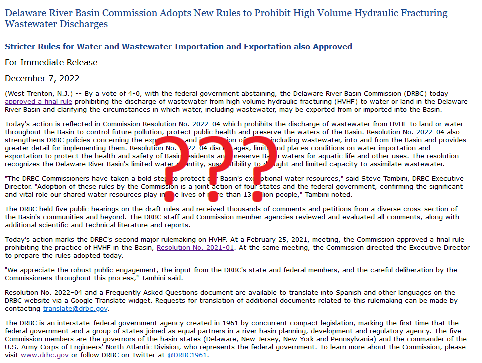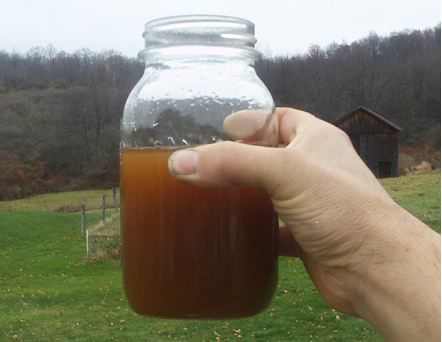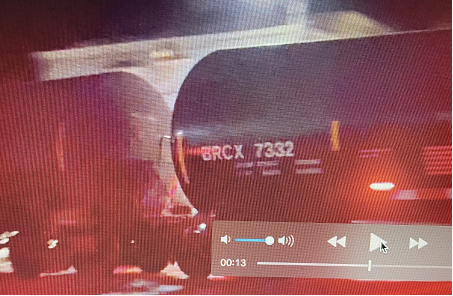
Tell DRBC Before Dec. 7 Meeting: NO Frack Waste in the Basin
December 1, 2022
WTF? Loopholes in DRBC Fracking Rules Put Us at Risk
December 8, 2022As Evidence Mounts, New Concerns About Fracking and Health

Well Water Near Fracking - Hickory, PA
By Jon Hurdle, Yale Environment 360, November 17, 2022
This bears out what DCS has been saying since our inception in 2008: Fracking is hazardous to your health! We have worked with Concerned Health Professionals of NY, the late Dr. Theo Colborn, founder of The Endocrine Disruption Exchange (TEDX) and many others to spread the word about the dangers of fracking. We filed an Amicus Brief in the US District Court for the Middle District of PA (January, 2017) and an Amicus Brief in the US Court of Appeals for the Third Circuit (March, 2017) to better inform these Courts about the adverse human health impacts of fracking.
DCS helped lead the successful fight to achieve a BAN on fracking in the Delaware River Basin and is now working to BAN the import of toxic frack waste into the Basin. None of these accomplishments would have been possible without your support. Your donation today helps us continue this important work.
Since the hydraulic fracturing boom began almost 20 years ago, there is more and more evidence of a correlation between fracking and health issues such as childhood cancer and the premature death of elderly people to respiratory issues and endocrine disruption. For example:
- This summer, a Yale School of Public Health paper showed that children living near Pennsylvania fracked gas wells are 2 to 3 times more likely to contract acute lymphoblastic leukemia (ALL) than those who live farther away.
- In January, a Harvard study found that seniors who live near or downwind from fracked gas wells have a higher risk of premature death, compared to those who do not live near wells.
- In April, the nonprofit Physicians for Social Responsibility and Concerned Health Professionals of New York published its most recent compendium of findings demonstrating the risks and harms of fracking. Since 2014, the compendium has tallied 2,239 peer-reviewed papers that found evidence of harm, with nearly 1,000 of those papers published since 2018.
- Dr. Ned Ketyer, president of Physicians for Social Responsibility Pennsylvania, says: “There are enough studies now that show that fracking threatens the health of workers and communities and threatens the mental and physical health of people who work nearby and children who go to school nearby.”




2 Comments
I want to thank the commission for their most intelligent ban of fracking in our river basin. As you know this is one of the most pristine rivers in the USA. Thanks for keeping it a National Treasure. I understand the need for energy. I also know we need to protect our people and treasures from the greed and temptation from corruption and self enrichment.
Since the River is not being used for energy purposes, why would we allow fracking wastes near our beautiful river, and why treat is as an endless well for creating more waste water. Let’s make it clear that our beautiful Delaware River is out of bounds for these actions. Unless you state this, you will be harassed by special interests looking to abuse our bounty. Please make the right choice by protecting the river. Thanks for your time and service to our river.
Thanks for your comment, Don. It’s important to understand that while today’s decision was an incremental step in the right direction, the press release did not elaborate on all of the things that the DRBC did NOT address.
Examples of activities that are beyond the scope of the proposed and final rule follow. The final rule does not:
Regulate air emissions from HVHF activities;
Categorically prohibit the transfer of HVHF wastewater into the Basin when no resulting discharge is proposed;
Regulate the transportation and storage of HVHF materials, which are regulated under detailed state and federal programs focused on these activities;
Categorically prohibit the transfer of water from the Basin if it would be used to support HVHF (or any other specified activity). However, the rule does limit the circumstances under which transfers of water from the Basin will be considered and provides for an evaluation of such proposals based on factors designed to ensure no harm to the Basin’s water resources or the health and safety of the Basin community; or
Prohibit road spreading of wastewater from conventional drilling activities, an activity not within the scope of DRBC’s proposed rulemaking. The Commission will continue to coordinate with the Basin states to review the scientific evidence regarding harm to water resources caused by road spreading of conventional oil and gas production wastewater and may in the future consider whether additional regulation of the practice is needed in the Basin.
DCS and the Delaware River Frack Ban Coalition will be releasing a formal statement, in response to today’s decision, in the coming days.
Thanks again for your continued support of our beautiful river! Unfortunately, the DRBC has not yet truly protected the basin from the dangers of gas drilling.